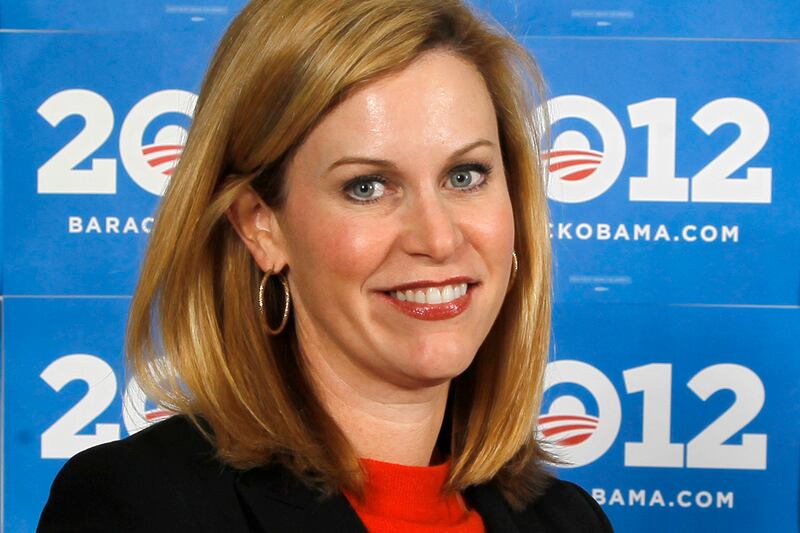It’s no surprise that Stephanie Cutter didn’t think much of the Republican convention and its blatant appeal to female voters. But there was one woman she singled out for praise.
“Ann Romney is an impressive person and did a good job of giving a lens into her husband,” she tells me. “She has a strong marriage and family and that is to be admired.”

That’s right, President Obama’s deputy campaign manager, who spends her days down in the dirty ditches of political muck, arm-wrestling the alligators, is giving props to the other side’s leading woman for a job well done.
As the president’s most visible female combatant, Cutter is too shrewd to fall into the trap of dissing the opposing candidate’s wife. When Democratic strategist Hilary Rosen said last spring that Ann Romney “never worked a day in her life,” the blogosphere exploded with outrage, prompting Rosen to apologize. Some tactics, like attacking wives and children, are simply off limits when doing battle in the political arena.
Kudos for the other campaign stop right there. Needless to say, Cutter didn’t think much of Republicans’ concerted effort in Tampa to appeal to women.
“It’s one thing to work women into your talking points. It’s another to tell them how you are going to educate their kids, how you are going to ensure they get health care, how we are going to rebuild infrastructure, how they are going to get equal pay,” Cutter says.
The Obama campaign—with Cutter and her boss, David Axelrod, leading the charge—is focusing much of its firepower on what it sees as Republicans’ antediluvian platform on women’s issues. Under this so-called war on women, Democrats have jumped aggressively on the party’s anti-abortion stand, most recently launching television ads blasting Mitt Romney and Paul Ryan for opposing taxpayer funding of Planned Parenthood and pushing legislation to allow religious groups to opt out of the federal mandate requiring them to pay for contraception.
The result is a sizable gender gap between the two campaigns. A Reuters/Ipsos poll last month shows Obama leading by 20 points among childless working women ages 25 to 45. He holds an 8-point lead among all women. The Romney campaign has no equivalent of Cutter. His closest adviser, Beth Myers, almost never talks to reporters. His top communications aides, Gail Gitcho and Andrea Saul, deal with print journalists but rarely appear on television, where the real hand-to-hand combat takes place.
Cutter doesn’t see her job as trying to appeal to female voters. She doesn’t have to. Her presence as a feisty warrior for Obama sends a message every time she pops up on the screen. As a symbol of the campaign’s gender diversity, Cutter cuts to the heart of all issues and delivers messages bringing out her inner pit bull when needed. In the last two days, she has argued on Today and Face the Nation that Americans are indeed better off than they were four years ago, an argument that some Obama surrogates are avoiding.
The president has long seemed to draw more sympathetic coverage than Romney, but Cutter denies that the media favor either side. “We both take our knocks,” she says.
There’s no denying Cutter is a role model for women of all political stripes. She goes toe-to-toe with the most powerful men—and women—in the country, and is one of the few women playing the game at this level.
But sometimes Cutter, who is hard to shake from her talking points, is too aggressive for her own good. When the campaign pounced on information that Romney had told federal regulators he was in charge of Bain Capital during a period he claimed to have left the company, Cutter told reporters he had either lied or committed a felony. Critics pounded the Obama team for appearing to accuse the candidate of committing a crime. But Cutter doubled down in a series of interviews, insisting she hadn’t called Romney a felon while refusing to back off her comments.
She can be ultra-cautious as well. When New York Times reporter Mark Leibovich sat down with Cutter at the Chicago headquarters, he began by saying, “How are you?” “Is this off the record?” she asked.
A graduate of Smith College and Georgetown Law School, Cutter, 43, has climbed the political ladder one rung at a time. She moved from the Clinton White House to Ted Kennedy’s staff, from communications director of the Democratic National Committee to the same post on John Kerry’s 2004 presidential campaign.
“The place where she showed what she was made of was the Kerry campaign,” says Kiki McLean, a longtime Democratic strategist. “She stepped in. You can step into a role but not fill the space. She filled the space.”
Still, Cutter drew some flak after the Swift Boat attacks left Kerry’s candidacy in disarray, and in the fall he brought in Joe Lockhart to essentially serve as chief spokesman.
But Cutter bounced back and secured a seat at the boys’ table. After working for Michelle Obama in the 2008 campaign, she ran communications on the president’s health-care plan and his two Supreme Court nominations, served as counselor to Treasury Secretary Tim Geithner, and wound up as a deputy senior adviser before joining the 2012 campaign.
Cutter instinctively avoids talking about herself, though. When I ask the unmarried adviser about the personal toll of political combat, she says that “both men and women struggle to find work-life balance.” What about her role as a female lieutenant in the campaign? “A variety of perspectives are always important.”
But friends recognize the price of going all out. “The campaign life is hard,” says McLean. “Politics, governing, can be challenging to a traditional domestic life.”
Cutter, meanwhile, quickly steers the conversation to her boss: “Take a look at how he built the White House. Michelle Obama is the most popular woman in the country. There’s Valerie Jarrett, two deputy chiefs of staff. From Hillary Clinton to Kathleen Sebelius to Janet Napolitano, the three biggest Cabinet positions are filled by women.”
The same goes for Obama’s top television defender, even if she declines to include herself among the leading ladies.






